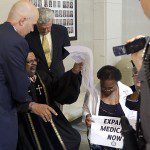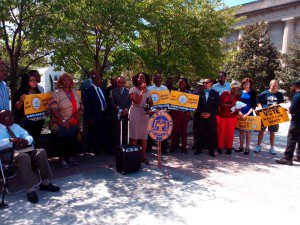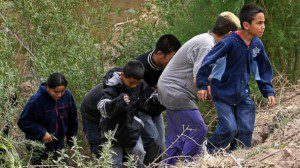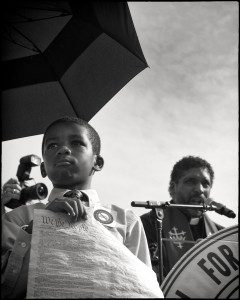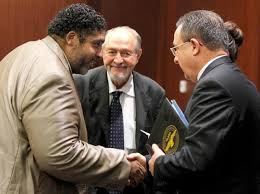
Bob Zellner’s civil rights memoir, The Wrong Side of Murder Creek, reads a bit like the Tom Hank’s movie Forrest Gump. A Southern Methodist kid, Zellner just happens to be in college in Montgomery when he wanders over to Dr. King’s church as part of a sociology project. He stumbles into the Freedom Riders, then finds himself taking a summer job at Highlander Folk School, where Rosa Parks got her nonviolence training. Pretty soon he’s on staff with SNCC, nearly killed by the Klan in McComb, escorting Mickey Schwerner’s wife to the White House. The list goes on. For over 50 years, Bob Zellner has walked alongside some of America’s most important voices for justice.
Which is why his question below is so important: why have civil rights organizations themselves fallen silent about the most effective grassroots organizing in the country?
By Bob Zellner
Running away from Southern grassroots organizing is becoming a past time of US civil rights leaders. Even listing recent embarrassments makes a long paragraph. Seeing the problem from a personal and Southern point of view, I sum up the situation as follows:
- Rev. Barber and the North Carolina movement was the biggest elephant in the room during the recent NAACP Convention in Orlando. Not only did its leaders fail to travel the few miles to Sanford, Fla. to protest the acquittal of George Zimmerman; they also stayed up half the night talking the NAACP youth branches out of putting in an appearance.
- Dr. Barber and his supporters, not allowed to speak at the convention, although every other “national leader” was given center stage.
- NC placed third in state accomplishments at the NAACP National Convention.
- Insult became injury when Crisis Magazinefailed to cover Moral Mondays and still, apparently, has no plans to do so, even though North Carolina’s upsurge, eight years in the making, is world news.
These insults to grassroots organizing were followed by increasingly embarrassing spectacles. Kept off the stage of the 50th anniversary of the March on Washington were most current activists. In addition to those from NC, the young Dream Defenders, young Latino organizers, LGBT fighters, and Jesse Jackson were pushed to the side. Representatives of local and state efforts wanting to do SNCC type organizing were shunted aside. Hundreds of civil rights activists signed a petition pleading with organizers to allow Rev. Barber to speak as an example of what Dr. King was talking about in the Dream Speech – “Go back to Alabama, etc…” But to no avail.
Even TODAY there are new slights at the hands of national civil rights leaders. On April 8-10, 2014, the LBJ Presidential Library is sponsoring a Civil Rights Summit marking the fiftieth anniversary of the Civil Rights Act of 1964, and still no representative of state-based grassroots organizing. This does not, apparently, embarrass our “national leaders.”
But they will not succeed in keeping William J. Barber and the light that is shinning from North Carolina, Georgia, Alabama, Mississippi and other former slave states under a bushel for long. When will they ever learn?
This Sunday, Palm Sunday, Dr. Barber will preach at the historic Riverside Church in New York City.


